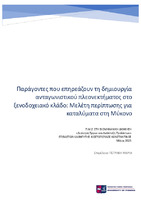Παράγοντες που επηρεάζουν τη δημιουργία ανταγωνιστικού πλεονεκτήματος στο ξενοδοχειακό κλάδο : μελέτη περίπτωσης για καταλύματα στη Μύκονο
Factors affecting the creation of competitive advantage in the hotel industry : a case study on a hotel in Mykonos

Προβολή/
Λέξεις κλειδιά
Competitive advantageΠερίληψη
Η φοιτήτρια Μαρία Πετράκη εκπόνησε τη διπλωματική εργασία αυτή στο πλαίσιο του μεταπτυχιακού προγράμματος «Διοίκησης Έργων και Ανάπτυξης Προϊόντων» του Πανεπιστημίου Πειραιώς στην Αθήνα, υπό την επίβλεψη του καθηγητή του μεταπτυχιακού προγράμματος, κ. Κωστόπουλου Κωνσταντίνου. Στα σύγχρονα ιδιαίτερα ανταγωνιστικά επιχειρηματικά περιβάλλοντα γίνεται απαραίτητο να μελετηθούν οι μεταβλητές που θα φέρουν μια εταιρεία στον επιδιωκόμενο στόχο της για ανταγωνιστικό πλεονέκτημα, ενισχύοντας έτσι την αποτελεσματικότητά της και κατ' επέκταση την επιτυχία της, καθώς ο ανταγωνισμός μεταξύ των ξενοδοχειακών επιχειρήσεων συνεχίζει να εντείνεται.
Στόχος της παρούσας διπλωματικής εργασίας είναι η διερεύνηση της συμβολής του ανθρώπινου δυναμικού στο ανταγωνιστικό πλεονέκτημα των καταλυμάτων καθώς και το πως επηρεάζει, η ποιότητα παροχής υπηρεσιών. Σκοπός αυτής της έρευνας θα είναι να εξετάσει πώς οι άνθρωποι, δηλαδή οι εργαζόμενοι μιας τουριστικής εταιρείας, δημιουργούν ανταγωνιστικό πλεονέκτημα για τον οργανισμό, δεδομένου ότι κάνουν δραστηριότητες τόσο στο front office όσο και στο back office και αντιπροσωπεύουν ουσιαστικά την επιχείρηση και το κατά πόσο, η ποιότητα παροχής υπηρεσιών από μόνης της διασφαλίζει το ανταγωνιστικό πλεονέκτημα . Η παρούσα έρευνα αποτελεί μία ποιοτική έρευνα και τα δεδομένα της συλλέχθηκαν μέσω της διεξαγωγής συνεντεύξεων από τους εργαζόμενους στο υπό μελέτη κατάλυμα (X Villas). Πρέπει να σημειωθεί ότι η έρευνα δείχνει ότι η διαχείριση του ανθρώπινου δυναμικού είναι καθοριστική για την ανάπτυξη ανταγωνιστικού πλεονεκτήματος και οι επιχειρήσεις στον κλάδο της φιλοξενίας βασίζονται στους εργαζομένους τους περισσότερο από ποτέ για να τους βοηθήσουν να ξεχωρίσουν στην ανταγωνιστική αγορά αναπτύσσοντας και εφαρμόζοντας μια στρατηγική που επικεντρώνεται στη συνεχή παράδοση εξαιρετικής αξίας στους πελάτες τους.
Με μια σύντομη ιστορική επισκόπηση των φαινομένων του τουρισμού και της ανάπτυξης των τουριστικών καταλυμάτων, στο πρώτο κεφάλαιο γίνεται λόγος για τη σημασία του τουριστικού τομέα για την εθνική οικονομία και το εξωτερικό και εσωτερικό περιβάλλον της. Στο δεύτερο κεφάλαιο, η έννοια της ανταγωνιστικότητας εξετάζεται τόσο σε γενικό όσο και σε ειδικό τουριστικό πλαίσιο. Αφού γίνει διάκριση μεταξύ ανταγωνισμού προορισμού και ανταγωνισμού ξενοδοχειακής βιομηχανίας, διερευνώνται οι αντίστοιχοι λόγοι για τον καθένα. Στη συνέχεια, περιγράφεται η ιδέα του ανταγωνιστικού πλεονεκτήματος, οι μέθοδοι επίτευξής του και τα καθοριστικά του στοιχεία. Το τρίτο κεφάλαιο προσδιορίζει τη μεθοδολογία έρευνας που ακολουθήθηκε. Τέλος, στο τελευταίο κεφάλαιο συζητείται η σημασία του ανθρώπινου δυναμικού και η παροχή υπηρεσιών μέσω της Μελέτη περίπτωσης για την καλύτερη κατανόηση στα καταλύματα Χ Villas στη Μύκονο, καθώς και τα αποτελέσματα της έρευνας.


